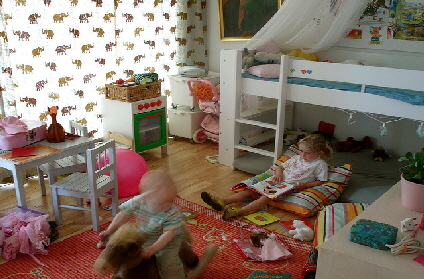|

No TV. Yes to messes
August 28, 2014
Encouraging your child to play imaginatively.
First, turn off the television. This includes their favorite DVDs, bible stories, Veggie Tales, Sesame Street and any other television program that you may believe has redeeming value. Do these programs have value for your children? Of course. But your child gets plenty of opportunities to watch TV. TV fogs over their brains. OK that may be a little strong. How about, “TV extinguishes their creative spark.”. You know what TV does. You have experienced it for these many years. TV is passive and completely engaging. All the imagination, intrigue, originality and creating is being done by the actors, producers, cast and crew. You know yourself the difference between watching TV and reading, cooking, or doing a project where you must at least follow directions. You know TV dulls our collective brains – so TURN IT OFF. For purposes of this discussion TV includes all screens: Television, computer, pad, phone…
Secondly, provide props and a stage for your children to play. Now I’ve used a theater metaphor here but don't worry you don't have to create a real stage or buy theater props. Practically anything can work as props. Your budding pirate doesn't need a real sword. A cardboard sword will serve perfectly and perhaps better and the eye patch doesn’t have to come from the Blackbeard museum, a piece of construction paper and some elastic string will be great. And what about the ship or castle? An Appliance cardboard box will be fantastic. Chairs, tables and blankets are pretty versatile. Your children may get imaginative and want to use a ladder. Safety first. It is highly unlikely that your children are going to play with a ladder, especially indoors, in a safe way. But aren’t you glad they asked your permission or that you noticed them traipsing out to the shed? For suggestions on where to find props go here.
Now the stage. What’s important is that your children be able to have some continuity. It’s important that they have a place to play where the stage can be set at least overnight. This is important for several reasons.
First, continuity and involved story lines is a good reason to let stuff sit overnight. Maybe the kids are in the middle of an epic naval battle when they get called to dinner while your rule is “Toys away before dinner” it makes sense to have that rule be a little flexible to allow for the story to develop. The longer play develops, the more likely they are to develop their characters, increase the complexity of their interactions and create problems and situations that must then be solved. Are your children able to recreate a situation that has been “cleaned up”? Well of course they are. But will they? How likely are they to “get back into it” as opposed to creating another scenario or new play?
Secondly, they get a night to think about it. As little as we understand dreams, there is some evidence that sleep and dreams are important to assimilate and cement the days activities. It appears that experiences and learning of the day are further strengthened by a good nights sleep. You can see how knowing that “the stage” was set for tomorrow would allow for different thoughts than if the slate was wiped clean.
Your actions speak loud! By allowing your children to keep their play going for another day, by tolerating the mess in the family room while you wind down after they have gone to bed, you send your kids the message that you are willing to sacrifice for them and that their imaginative play is important to you.
Playing is work for your children. You imagine the wonderful future before them. Encourage them to imagine too.
|